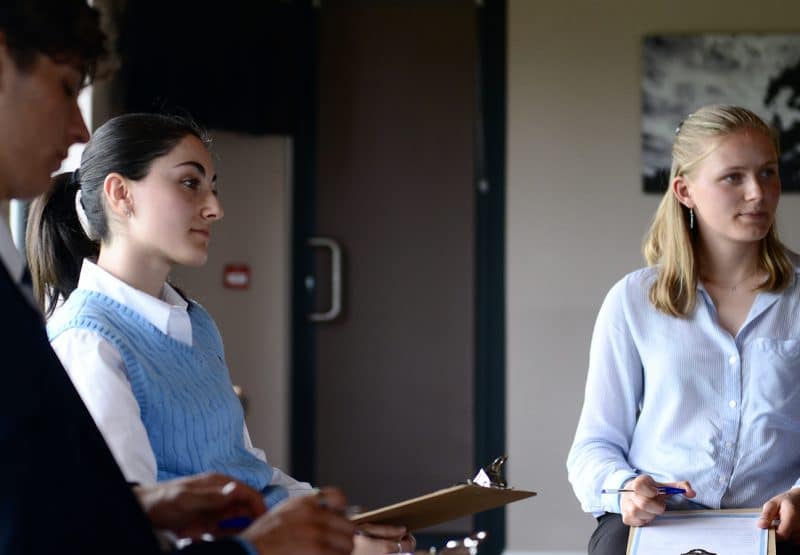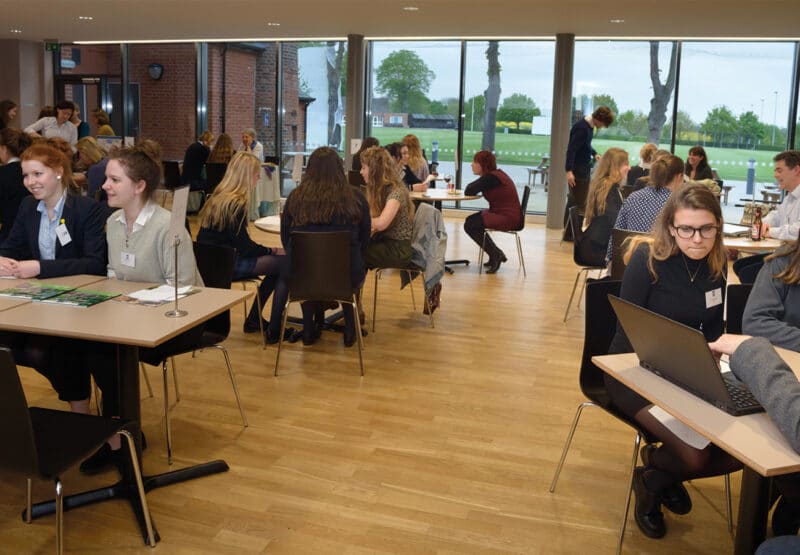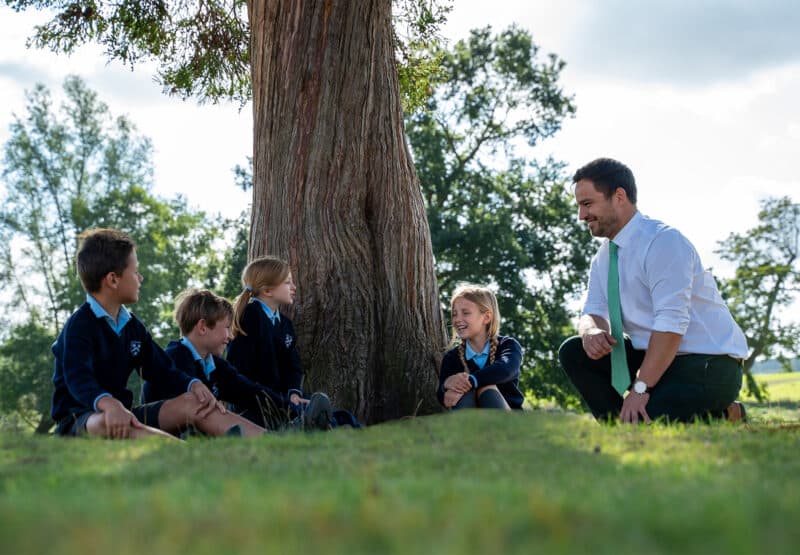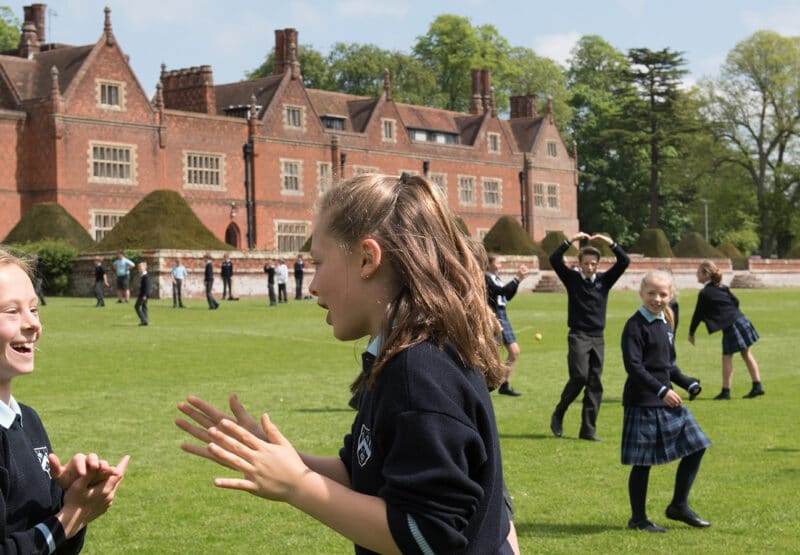We offer a broad, ambitious, exciting and accessible academic curriculum, consisting of both A Levels and BTEC courses.
Our range of subjects and courses allow all pupils to flourish, whatever their individual journeys may be. A Levels provide a more traditional academic programme, with external examinations taking place at the end of the two-year course. While BTEC courses involve more group work, vocational expertise and continual assessment. BTEC courses are highly respected by universities and employers and will suit many pupils far more than the traditional route. Pupils can also choose a mix of A Level and BTEC courses to suit their particular interests and talents.
Our Academic Approach
At the heart of our academic ethos are three core principles:
Intellectual Rigour
Learning without thought is labour lost; thought without learning is perilous.”
CONFUCIUS, THE SAYINGS OF CONFUCIUS
At Framlingham College our desire is to embed a love of learning in each child, regardless of where their talents lie, where our pupils are encouraged to question ‘the why?’ and ‘the how?’ and not just ‘the what?’. To achieve this, our learning culture is ambitious and driven by the belief that we ‘should all aspire to be the best we can be’, having high expectations for ourselves and others.
Academic fulfilment is measured by involvement and application, not just achievement. At Framlingham our core belief is in the individual and so we recognise that every child’s journey will be different and for every child, the measure of success is therefore different.
Intellectual Curiosity
Our pupils are invited to explore, read, reflect, debate and innovate.”
DAVID ASHTON, DEPUTY HEAD ACADEMIC, FRAMLINGHAM COLLEGE
We encourage pupils to cultivate a desire to know more. By providing them with engaging and challenging lessons that inspire each of them to think and discover for themselves, we hope they’ll go on to continuously question the norm and be inquisitive at every turn.
We help to nurture a growth mindset in pupils to enable them to become resilient and never give up. By supporting our pupils, we encourage deep learning to help them understand what they are doing, giving them opportunities to reflect on their work and improve it.
In the modern professional world, our young people will be required to learn new skills and potentially work in industries yet to be created. They will need to be curious, flexible, creative, and intelligent problem-solvers. We arm our pupils with attitudes and habits so that whatever their next steps are, they will be able to ask the right questions, adapt and learn the skills required.
Intellectual Activity
One of the beauties of secondary school learning [at Framlingham College] is the ability to further your learning. Often people confuse being stretched with being overworked, yet throughout all my time at the College I’ve realised how the balance is just right.”
DAN, FRAMLINGHAM COLLEGE SENIOR SCHOOL PUPIL
A rich and stimulating programme of courses across all year groups also forms an integral part of our curriculum, so that our pupils are nourished by intellectual activity beyond the classroom and beyond the confines of the school and our immediate surroundings.
There are opportunities to take part in Model United Nations, Inter School Quiz Club and English Speaking Union Debating with a vast range of clubs and societies on offer, ranging from Philosophy Forum to Investment to Chinese Calligraphy.
We offer a wide variety of field trips to make the subjects practical and relevant to the pupils, along with making good use of the Suffolk landscape for local fieldwork, whilst our Physics pupils attend talks at the Cavendish Laboratory in Cambridge on a termly basis. Religious Studies pupils visit key sites such as the Buddhist temple in London and Ely Cathedral with Drama students regularly attending performances in locations such as Ipswich, Cambridge and London.
As an extension of learning and interests, pupils can enjoy talks from inspirational speakers around the world such as Sir Richard Dearlove (former Head of MI6), Marc Morris (historian and international expert on castles) and Suzie Imber (astronaut).
To stretch their learning, pupils in Year 12 have the opportunity to complete the highly regarded Extended Project Qualification (EPQ) which is an individual, extended piece of research leading to a formal award equivalent to an A Level. The qualifications encourages the development of independent learning skills, as well as providing a valuable opportunity to move beyond the set curriculum. More information on EPQ can be found below.
Reading
We believe in the power of reading and we encourage all pupils to pick up a book as often as they can – whether that’s a novel, an audio book or a newspaper article. We talk about written stories often because we want our young people to be interested in learning and understanding more about the world – its past, present and future. University students may need to read for several hours a day and with this in mind, we want our pupils to be confident and able to rise to – and enjoy – this challenge when the time comes. Of course, reading is also one of the best ways in which we can all find some quiet and calm, which is vital for wellbeing.
Subject choices
Parents are consulted at every stage of the decision-making process regarding academic choices. When it comes to selecting subjects, pupils are guided by their Tutors, Housemaster or Housemistress (HM) and our Careers and Higher Education Department, with options discussed in detail during Year 11, before the final choices are made. The majority of pupils start with three A Level subjects (or the BTEC equivalent). BTEC courses are offered at Extended Certificate (equivalent of one A Level) and Diploma (equivalent to two A Levels).
The following two tables illustrate how BTEC Grades compare to A Level Grades:
| Diploma | Extended Certificate | A Level Grade | UCAS Points |
|---|---|---|---|
| D*D | 112 | ||
| D*D | 104 | ||
| DD | 96 | ||
| DM | 80 | ||
| MM | 64 | ||
| Distinction* (D*) | A* | 56 | |
| MP | Distinction (D) | A | 48 |
| PP | Merit (M) | C | 32 |
| Pass (P) | E | 16 |
| A Level Grade | UCAS Points |
|---|---|
| A* | 56 |
| A | 48 |
| B | 40 |
| C | 32 |
| D | 24 |
| E | 16 |
Extended Project Qualification
The Extended Project Qualification (EPQ) is an enriching academic opportunity that we are proud to offer in the Sixth Form. It requires pupils to produce an extended piece of writing on a topic of their choice, or to produce a research-based ‘artefact’ (such as a film, item of clothing or app). Highly regarded by universities, the EPQ is worth half an A Level and allows pupils to develop skills in areas such as research, work management and presentation.
Perhaps most importantly, it is a chance for pupils to indulge their intellectual curiosity by delving into a subject they are interested in beyond their Sixth Form studies. It is a stimulating challenge, and a valuable way to prepare for life at university and then the world of work. Our Academic Scholars are expected to complete the EPQ, and we encourage nearly all of our Sixth Form pupils to take on this excellent academic challenge. For many pupils, the EPQ is the most enjoyable and significant academic achievement of their Sixth Form experience.
Gold Arts Award
The Gold Arts Award is an alternative to EPQ in Year 12. It is a Level 3 Certificate in the Arts requiring 150 learning hours and this award carries 16 points on the UCAS tariff.
To achieve a Gold Arts Award, young people collect evidence in an individual arts portfolio of their experiences of a personal arts development and their leadership of an arts projects.
To find out more, click here.
Scholarships
We offer 16+ Academic, Art, Drama, Music and Sport Scholarships. Those who qualify for a scholarship in two fields are awarded an Albert Memorial Scholarship. Our highest Academic Scholarships are awarded a Stapleton Scholarship. Our scholars are expected to offer high standards of performance in their chosen field as well as demonstrating commitment, ambition and a readiness to speak openly about their subjects with others. We want our scholars to inspire their peers! They are also expected to become richly involved in all aspects of College life.





